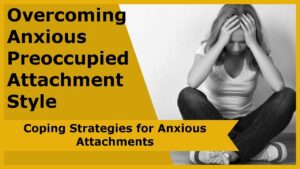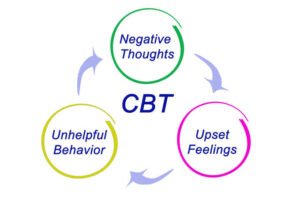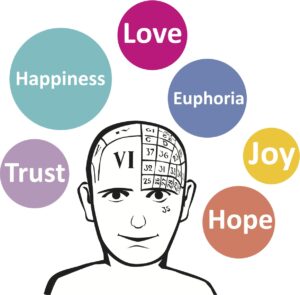Contents
- 1 What Is An Anxious Preoccupied Attachment?
- 2 Sign That You May Have Anxious Preoccupied Attachment
- 3 Causes & Effects of Anxious Preoccupied Attachment On Children
- 4 How Does Anxious Preoccupied Attachment Affect Relationship?
- 5 How To Overcome Anxious Preoccupied Attachment?
- 6 Tips For Helping You Partner With Anxious Preoccupied Attachment
- 7 Difference B/w Anxious Preoccupied And Dismissive Avoidant Attachment?
- 8 Therapy To Treat Anxious Preoccupied Attachment
- 9 Conclusion
What Is An Anxious Preoccupied Attachment?
 An anxious preoccupied attachment style is a type of attachment that is characterized by clingy and needy behaviors. People with this type of attachment often feel insecure or jealous when they’re not with their significant other. They need constant reassurance from their partner that they are loved, accepted, and so on. If you have this type of attachment, it’s important to be mindful of the behaviors you exhibit during your relationships because they could lead to destructive behavior patterns in the future if left unchecked.
An anxious preoccupied attachment style is a type of attachment that is characterized by clingy and needy behaviors. People with this type of attachment often feel insecure or jealous when they’re not with their significant other. They need constant reassurance from their partner that they are loved, accepted, and so on. If you have this type of attachment, it’s important to be mindful of the behaviors you exhibit during your relationships because they could lead to destructive behavior patterns in the future if left unchecked.
We all know that there’s a difference between healthy and unhealthy attachment. It’s important to know the different types of attachments and their behaviors in order to identify your own attachment style. The anxious preoccupied attachment style is characterized by their clingy, needy behavior which leaves the person feeling insecure or even jealous when they’re not with their significant other.
Sign That You May Have Anxious Preoccupied Attachment
There are a lot of signs that can indicate whether or not you have an anxious preoccupied attachment style. Some people have one sign. Others have many more than just one. If you’re unsure, it can help to identify them and find out what they mean!
- Feelings of jealousy
- Constant wonder that they love and accept you
- Jealous of other people their partner seems interested in
- Insecurity, if you feel insecure when not around your partner
- A need for constant reassurance from your partner
These are major signs that you may have an anxious preoccupied attachment. If having this type of attachment with your significant other makes you feel insecure about yourself or their feelings towards you, then it’s important to make a change. If you are experiencing any of these symptoms. Then it’s likely that anxious preoccupied attachment is something that affects you.
Causes & Effects of Anxious Preoccupied Attachment On Children

Anxious preoccupied attachment is a type of insecure attachment that is commonly developed by children who have been neglected or abused. These children may not be able to rely on their caregivers to provide a sense of safety and security, causing them to become clingy and excessively needy.
Fearful & Avoidant
This type of insecure attachment may also develop as a result of overprotective parenting, which can cause children to become fearful and avoidant later in life. Children who experience anxious preoccupied attachment as a result of overprotective parenting may be overly sensitive as they grow up.
Anxious
Anxious-preoccupied children are often very responsive to parental caregiving efforts because they lack self-confidence and have low self-esteem. However, these children are often very demanding of attention and care, causing their parents to grow tired. As a result, anxious-preoccupied children tend to have inconsistent levels of interaction with their caregivers, making them prone to anxiety in the future.

Anxious preoccupied attachment can also be created by marital conflict or peer rejection. If a child is rejected by peers. He will be discouraged from talking to others and encouraged to keep his thoughts and feelings hidden. This can cause him to be anxious about social relationships later in life. As he has no friends with whom he can share his emotional problems.
Marital conflict causes the child to feel stressed. This may lead him or her to develop an unconscious desire for attachment to one parent. This desire for comfort often causes children to be clingy and needy around that particular caregiver. Especially when the other parent is creating conflict in the home.
Anxious preoccupied attachment can also develop as a result of inconsistent parenting practices. An inconsistently responsive caregiver will not nurture the child enough, causing him or her to become anxious and demanding when seeking out care.
How Does Anxious Preoccupied Attachment Affect Relationship?
The anxious preoccupied attachment style is characterized by clingy, needy behavior. The person with this type of attachment feels insecure or even jealous when they’re not with their significant other. This type of attachment has a tendency to hurt the relationship in a way that’s deep and long-lasting because it can make you think you’ll never be good enough for your partner.
Sometimes an anxious preoccupied person needs extra reassurance to feel secure in their relationship. It can be frustrating for those who are in a relationship with them because they feel as though they’re not good enough. While you can’t change your partner’s attachment type. It’s important to understand that their behavior is just a result of how they were brought up and what relationships looked like for them growing up. This will help you be more patient with them moving forward. If your partner is suffering from anxiety or depression. It’s important to help them get the treatment they need in order to feel better.
How To Overcome Anxious Preoccupied Attachment?

If you find yourself exhibiting this type of attachment or have realized that your partner does, it’s important to be mindful of the behaviors you exhibit during your relationships. This is because these behaviors could lead to destructive behavior patterns in the future if left unchecked! It’s also imperative for you to acknowledge that you or your partner has this type of attachment.
- You should never feel as though you’re not good enough for your partner. If you do, then this is a sign that it’s time to reflect on and change the behaviors and patterns in your relationship.
- It can be helpful to find out what your attachment style is and how it affects your behavior patterns in relationships. You may also want to consider visiting a therapist to help you navigate through this difficult time.
- Find what triggers the emotional responses from your anxious preoccupied attachment and how you can cope with these triggers in a constructive way. This will be helpful for both you and your partner.
- If your partner is exhibiting any of these signs or has an anxious preoccupied attachment, it’s important that they acknowledge this. You can help them understand their own behavior and make a change for the better in order to improve your relationship!
- When you’re ready, practice mindful communication. This means communicating with each other in a way that’s respectful and constructive. By doing so, you will both feel heard and valued by the other and this is important for any healthy relationship.
- If you want to be with your partner and feel as though they’re the one for you, focusing on these steps will help you cultivate a better relationship together!
Tips For Helping You Partner With Anxious Preoccupied Attachment

These are some tips that can help you deal with your partner who has anxious preoccupied attachment-
- Try to be patient.
- Make sure you’re there for them when they need support.
- If they become too clingy, it’s okay to set boundaries so that the relationship stays healthy.
- Try to avoid saying hurtful things because this will only make them feel insecure in the relationship.
- Keep in mind that your partner is trying their best and that this attachment style is just a result of how they were brought up and their experiences.
- Let them know you love and accept them, even if you think they might not be good enough for you.
- Never say hurtful things, such as “What’s wrong with you?” or make your partner feel insecure in the relationship.
- You can also try to be patient and understanding when they start to feel worried about their relationship, expectations for their relationships; having a fear of rejection, and constantly feeling insecure in their relationship.
If you feel as though any of the above behaviors will help you be with your partner more easily, then share this article with them so that they can read it too.
Difference B/w Anxious Preoccupied And Dismissive Avoidant Attachment?
You may find yourself wondering why someone with anxious preoccupied attachment is different than someone with dismissive avoidant attachment. The biggest difference is that those with anxious preoccupied attachment want to be close and rely on their partner, while people with dismissive avoidant attachment do not desire closeness and prefer to distance themselves from others.
This type of relationship can leave one or both partners feeling lonely and unloved; this is because they’re not getting the closeness they need from their partner. By understanding how each attachment style behaves in a relationship, you can better understand why your partner acts a certain way and be more patient with them when needed.
Therapy To Treat Anxious Preoccupied Attachment

Therapy treatment for anxious preoccupied attachment is a form of relational therapy meant to assist individuals in coping with their anxiety. It involves the therapist addressing the individual’s internalized relationships. The therapist also helps the individual develop skills that are useful in their interpersonal relationships. The therapy focuses on the feelings, thoughts, and behaviors of the individual.
Some people are able to modify their attachment styles through self-awareness, but many need assistance from a professional therapist. Therapy for anxious preoccupied attachment can be difficult or helpful depending on how committed you are to getting better and how credible you find your doctor.
Types of therapy for anxious preoccupied attachment include psychodynamic, cognitive-behavioral, supportive, and dynamic therapies.
Cognitive-Behavioral Therapy
 Cognitive-behavioral therapy for anxious preoccupied attachment encourages patients to confront their avoidance of human relationships by testing the validity of their negative thoughts in social situations. Group cognitive-behavioral therapy usually has 2-3 sessions each week, lasting about 90 minutes each. Therapists assist patients by teaching them concepts that will help manage anxiety, such as identifying maladaptive behaviors, changing cognitions, and relaxation. Patients then role-play to practice in a safe environment and process their feelings with others in the group.
Cognitive-behavioral therapy for anxious preoccupied attachment encourages patients to confront their avoidance of human relationships by testing the validity of their negative thoughts in social situations. Group cognitive-behavioral therapy usually has 2-3 sessions each week, lasting about 90 minutes each. Therapists assist patients by teaching them concepts that will help manage anxiety, such as identifying maladaptive behaviors, changing cognitions, and relaxation. Patients then role-play to practice in a safe environment and process their feelings with others in the group.
Supportive Therapy
Supportive therapy for anxious preoccupied attachment uses unconditional positive regard to help patients form secure attachments with others. This type of therapy is helpful in treating avoidant people who feel that they need protection from others.
Dynamic Therapy
Dynamic therapy for anxious preoccupied attachment takes place over a long period of time and involves the development of a trusting relationship between patient and therapist. The aim is to bring patients’ repressed feelings into conscious awareness by exploring defenses, resistance, and transference.
Group dynamic therapy usually has 2-3 sessions per week for 90 minutes each. The therapist helps patients explore their relationships with others by using role-playing. Patients learn that there are rules in relationships and how to give up their defensive posture. Patients also learn how to be assertive and communicate feelings in healthy ways with others.
Psychodynamic Psychotherapy
 Psychodynamic therapy for anxious preoccupied attachment encourages patients to express their emotions in sessions with the psychologist. The aim is to help patients connect their unconscious thoughts to relationship dynamics. This strategy helps patients understand how they are perpetuating their current relationships through childhood coping mechanisms.
Psychodynamic therapy for anxious preoccupied attachment encourages patients to express their emotions in sessions with the psychologist. The aim is to help patients connect their unconscious thoughts to relationship dynamics. This strategy helps patients understand how they are perpetuating their current relationships through childhood coping mechanisms.
Individual psychodynamic psychotherapy is a long-term approach that is accomplished through weekly, 50 minute sessions. The therapist helps the patient explore the meaning of their symptoms in their life. By doing so, patients learn about their anxiety and how it affects relationships with others. Through this process, patients develop a stronger sense of self and realize the origin of their symptoms.
Medication
Medication is used to treat symptoms for anxious preoccupied patients when therapy has not been effective or if therapy cannot be done due to other medical conditions. Medications include anti-anxiety medications, antidepressants, and beta-blockers.
Conclusion
The anxious preoccupied attachment style can have a profound effect not only on yourself but also on your relationships. If you identify with this attachment style, it’s important to understand how your behavior patterns are affecting the relationship dynamics. You also have to be willing to take responsibility for these behaviors so that you can change them and improve your relationship!
If you find yourself having difficulty changing certain behavior patterns or managing your emotions when in a relationship, then there may be an underlying issue. You should visit a therapist to help you work through this difficulty to find out what the root of the problem is and how you can overcome it.
For more information, please contact MantraCare. Relationships are an essential part of human life. It is the connection between people, and it helps us to form social bonds, understand and empathize with others. If you have any queries regarding Online Relationship Counseling experienced therapists at MantraCare can help: Book a trial therapy session


